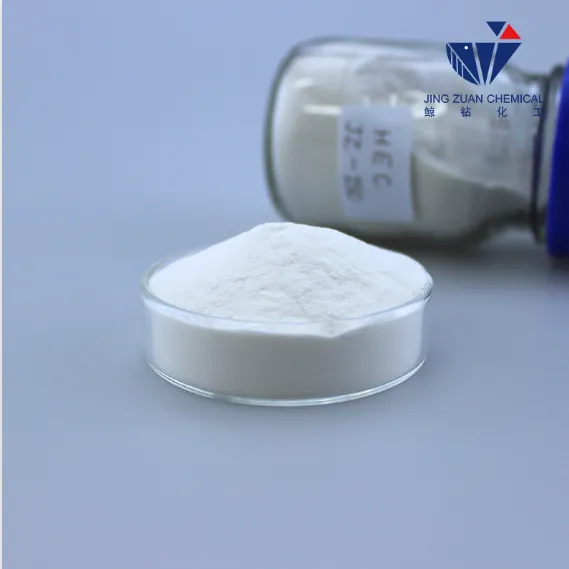
Apr . 02, 2025 13:40 Retounen nan lis la
Hydroxyethyl Cellulose (Hec): Uses, Suppliers, And Buying Guide
Hydroxyethyl Cellulose (HEC) is a non-ionic, water-soluble polymer widely used in paints & coatings, construction materials, oil & gas drilling, adhesives, and industrial cleaning products. It acts as a thickener, stabilizer, binder, and film-forming agent, enhancing the performance of various formulations.

This article explores the uses of hydroxyethyl cellulose, how to buy HEC, and the best hydroxyethyl cellulose suppliers available for bulk purchasing.
Hydroxyethyl Cellulose Uses
1. Paints & Coatings
- Thickening Agent: HEC is commonly used in latex paintsand water-based coatings to enhance viscosity and improve application performance.
- Improves Pigment Suspension: Prevents pigment settling in industrial coatingsand architectural paints.
- Enhances Durability: Provides better film-forming properties, improving weather resistanceand coating adhesion.
2. Construction Industry
- Cement-Based Mortars & Tile Adhesives: HEC improves water retention, ensuring strong adhesionand easy workability in cement-based materials.
- Gypsum & Plaster: Enhances smooth applicationand prevents cracking by improving moisture control.
- Self-Leveling Compounds: Helps control flowabilityand thixotropy of self-leveling flooring materials.
3. Oil & Gas Drilling
- Drilling Fluids & Fracturing Fluids: HEC is used in oil well drillingto control fluid viscosity and stabilize drilling muds.
- Improves Suspension Stability: Helps keep solid particles evenly distributed, reducing settlingin drilling applications.
4. Industrial & Household Cleaning Products
- Detergent Thickener: HEC is added to surface cleaners, dishwashing liquids, and industrial degreasersto maintain a consistent viscosity.
- Foam Stabilizer: Improves foam retentionin liquid cleaning formulations.
5. Adhesives & Binders
- Wallpaper Adhesives: HEC provides excellent bonding strengthand smooth application in wallpaper pastes.
- Ceramic & Tile Adhesives: Improves adhesion and workabilityin tile-setting materials.
6. Textile & Paper Industry
- Fabric Printing & Coating: Used as a thickening agent in textile printing pastes, ensuring better color retentionand even application.
- Paper Coatings: Enhances smoothnessand surface properties of coated papers.
How to Buy Hydroxyethyl Cellulose (HEC)?
When purchasing hydroxyethyl cellulose, consider the following factors to ensure quality and suitability for your application:
1. Choose the Right Grade
HEC is available in different viscosity grades and purity levels for specific uses:
- Industrial-Grade HEC: Used in paints, coatings, construction, and cleaning products.
- Oilfield-Grade HEC: Designed for drilling fluids and hydraulic fracturing applications.
- High-Viscosity HEC: Offers better thickeningand is ideal for cement and self-leveling compounds.
2. Quality & Certification
- Look forISO-certified suppliers to ensure consistent quality.
- Ensure compliance with ASTM standards(for construction applications) or API standards (for oil drilling).
3. Bulk Purchase & Packaging
- HEC is commonly sold in 25kg bags, 500kg jumbo bags, or custom packagingfor bulk orders.
- Buying in bulkcan reduce the cost per unit and ensure continuous supply.
4. Delivery & Logistics
- Consider lead timesfor delivery, especially for large-scale industrial
- Work with reliable supplierswho offer global shipping and consistent inventory.
Hydroxyethyl Cellulose FAQs
1. What is hydroxyethyl cellulose used for?
HEC is used in paints & coatings, cement-based materials, oil drilling fluids, adhesives, and industrial cleaning products. It acts as a thickener, stabilizer, and binder, improving workability and performance in various applications.
2. How do I choose the right hydroxyethyl cellulose grade?
- For paints & coatings: Use medium- to high-viscosity HECfor better film formation and pigment dispersion.
- For construction: Use industrial-grade HECwith high water retention.
- For oil drilling: Choose oilfield-grade HECthat provides viscosity control and suspension stability.
3. Where can I buy hydroxyethyl cellulose in bulk?
You can purchase bulk HEC from global chemical suppliers, construction material distributors, and paint raw material manufacturers.
4. What is the price of hydroxyethyl cellulose?
The price of HEC varies depending on the grade, quantity, and supplier location.
- Industrial-grade HECcosts approximately $2,000 to $3,500 per metric ton.
- High-purity HECfor specialized applications may be more expensive.
5. How is hydroxyethyl cellulose different from other cellulose ethers like HPMC?
- HEC (Hydroxyethyl Cellulose): Non-ionicand used in paints, coatings, cement, and oil drilling.
- HPMC (Hydroxypropyl Methylcellulose): Offers thermal gelationand is more common in tile adhesives and self-leveling compounds.
Hydroxyethyl Cellulose (HEC) is a versatile thickening and stabilizing agent widely used in paints, construction, oil drilling, adhesives, and industrial cleaning products.
When buying hydroxyethyl cellulose, consider factors such as grade, supplier reliability, and bulk pricing to get the best value for your specific application. Leading HEC suppliers provide high-quality HEC for industrial use worldwide.
-
Versatile Hpmc Uses in Different Industries
NouvèlJun.19,2025
-
Redispersible Powder's Role in Enhancing Durability of Construction Products
NouvèlJun.19,2025
-
Hydroxyethyl Cellulose Applications Driving Green Industrial Processes
NouvèlJun.19,2025
-
Exploring Different Redispersible Polymer Powder
NouvèlJun.19,2025
-
Choosing the Right Mortar Bonding Agent
NouvèlJun.19,2025
-
Applications and Significance of China Hpmc in Modern Industries
NouvèlJun.19,2025







